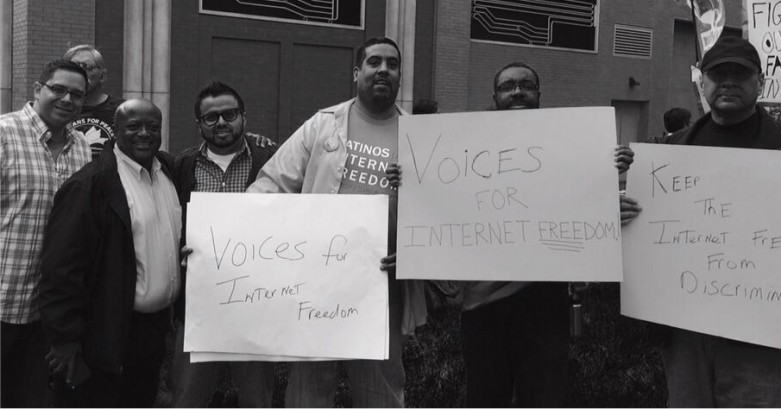June 1, 2018

Center for Media Justice works to build a powerful movement for a more just and participatory media and digital world. Its Voices for Internet Freedom project represents communities of color in the fight for real network neutrality and an open, non-discriminatory internet. Thanks to Voqal’s support, the Voices for Internet Freedom coalition successfully mobilized historically marginalized communities to oppose efforts at dismantling net neutrality.
In the cold Philadelphia dawn, 40 people hopped on a bus to join over 100 people gathered for the Wake Up Call Rally in Washington, D.C.: mothers, seniors, artists, activists and students. There was a time when people didn’t really know what net neutrality was, let alone care enough about it to take action. That time has passed.
On the bus was Connie Freeman, a senior living on fixed income, who knew that repealing net neutrality would give companies like Comcast and Verizon more power to make the internet inaccessible and unaffordable to people like her. She was so fired up that she got her daughter and granddaughter to join her.
Meanwhile, Alex Wiles, a young student activist at the rally said the internet mattered to him because “it allows us to find friendship and solidarity, in an otherwise totally isolating world. Which is crucial for the marginalized and youth of this country with no other support network to turn to.”
While the rally’s purpose was to publicly oppose the repeal of net neutrality, it also demonstrated that people of color are — and need to be — at the frontline of fighting for the community’s digital voices. Center for Media Justice has been successful in lifting up the voices of communities who aren’t often heard on this issue. While they may have lost the vote at the Federal Communications Commission, it built a movement of people willing to continue the fight for net neutrality.
In addition to successfully rallying civil rights leaders to the cause of net neutrality, this effort also moved members of the Congressional Tri-Caucus from a position of antagonism toward net neutrality to a position of support — in large measure due to the broad and diverse racial justice coalition built through the work of Center for Media Justice. While the fight for net neutrality has been an uphill battle, groups like the Center for Media justice remind us that it is one worth fighting.